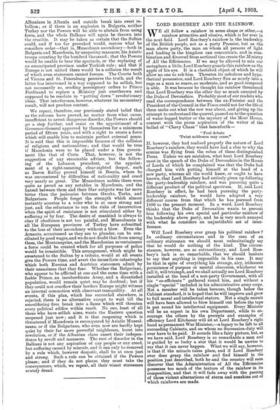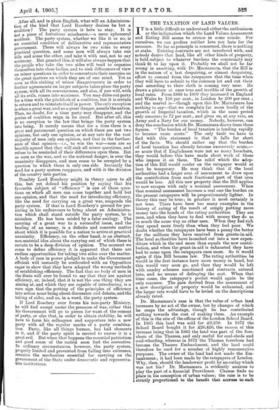LORD ROSEBERY AND THE RAINBOW.
WE all follow a rainbow in some shape or other,---a rainbow attractive and elusive, which is for ever in the next field. Lord Rossbery's rainbow is the leadership of the British people, not as a party Premier, but as the man above party, the man on whom all persons of light and leading in the kingdom can concentrate, and in com- bination and divorced from sectional ties create the Ministry of All the Efficiencies. If we may be allowed to mix our metaphors a little, Lord Rosebery guards this rainbow as the apple of his eye. It is a cherished object of which he will allow no one to rob him. Threaten its nebulous and hypo.. thetical possession, and Lord Rosebery flies as nearly into a rage as a man so suave, so moderate, and so good-tempered is able. It was because he thought his rainbow threatened that Lord Rosebery was the other day so much annoyed by the Duke of Devonshire. Probably most of our readers who read the correspondence between the ex-Premier and the President of the Council in the Times could not for the life of them make out what the row was about, and giving up the attempt to understand the quarrel, passed on to the question of water-logged butter or the mystery of the Moat House, content with the pious aspiration of the writer of the ballad of "Chevy Chase" that henceforth— "Foul debate 'Twist noblemen may cease."
If, however, they had realised properly the nature of Lord Rosebery's rainbow, they would have had a clue to why the ermine was flying from the robes of these distinguished Peers. Unless we are mistaken, what hurt Lord Rosebery most in the speech of the Duke of Devonshire in the House of Lords of which he complained was that the Duke had charged him with putting himself at the head of a new party, whereas all the world knew, or ought to have known, that Lord Rosebery had entirely given up following the party-leadership rainbow, and was pursuing quite a different product of the political spectrum. If, said Lord Rosebery in effect, he had been pursuing the party. leadership rainbow, he would have adopted a very different course from that which he has pursued from 1896 to the present moment. In a word, Lord Rosebery thinks that the Duke of Devonshire wants to prevent him following his own special and particular rainbow of the leadership above party, and he is very much annoyed with what he considers an unjustifiable act of inter- ference.
Will Lord Rosebery ever grasp his political rainbow ? In ordinary circumstances and in the case of an ordinary statesman we should most unhesitatingly say that he would do nothing of the kind. The circum- stances, however, are so extraordinary, and Lord Rose- bery's luck is so remarkable, that we should hesitate to say that anything is impossible in his case. It may be that in spite of everything his strange, airy, iridescent persistence of purpose or mental obsession, whichever we call it, will triumph, and we shall actually see Lord Rosebery installed at the head of a non-party Government, with all his " co-efficients " gathered round him, and without a single "special" included in his administrative army corps. Not a member will be taken because, though below the Cabinet standard, it is hoped that he will improve and grow to full moral and intellectual stature. Not a single recruit will have been allowed to blow himself out before the tape is put round his intellectual equipment. Every Minister will be an expert in his own Department, while to en- courage the others by the precepts and examples of efficiency Lord Kitchener will sit at Lord Rosebery's right hand as permanent War Minister,—a legacy to be left to all succeeding Cabinets, and on whom no Succession-duty will ever have to be paid. It sounds like a fairy picture, but, as we have said, Lord Rosebery is so remarkable a man and is guided by so lucky a star that it would be unwise to say that it can never happen. What we will say, however, is that if the miracle takes place, and if Lord Rosebery ever does grasp the rainbow and find himself in the position just described, both he and the country will soon discover that the Administration of All the Efficiencies possesses too much of the texture of the rainbow in its composition, and that it will fade away with the passing of those violent alternations of storm and sunshine out of which rainbows are made. After all, and in plain English, what will an Administra- tion of the kind that Lord Rosebery desires be but a coalition? The party system is here to stay. It is not a piece of fortuitous mischance,—a mere ephemeral accident. The party system, whether we like it or no, is an essential condition of deliberative and representative government. There will always be two sides to every practical question, and, some men will always take one side and some the other, and take it with zeal, not to say acrimony. But granted this, it will also always happen that the people who take the two sides will tend to organise themselves into close bodies, and to sink differences of view on minor questions in order to concentrate their energies on the great matters on which they are of one mind. Yet as soon as this sinking of minor disagreements in order to further agreements on larger subjects takes place the party system, with all its conveniences, and also, if you will, with all its evils, comes into existence. You may drive out party for a time with the pitchfork of a coalition, but it is certain to return and to reinstate itself in power. The only exception is when a great war, and so a great danger, assails the nation. Then, no doubt, for a time party may disappear, and the genius of coalition reign in its stead. But after all, this is no exception to the law that brings the party system into being. It merely means that for a time there is a great and paramount question on which there are not two opinions, but only one opinion, or at any rate for the vast majority of men only one opinion, and that in the further- ance of that opinion—i.e., to win the war—men are so heartily agreed that they will sink all minor questions, and refuse to be reminded of their differences upon them. But as soon as the war, and so the national danger, is over the unanimity disappears, and men cease to be occupied by a question to which there is only one side. Instantly the need for a party system reappears, and with it the division of the country into parties.
Possibly Lord Rosebery might in theory agree to all this, but yet defend his position by saying that his favourite subject of " efficiency " is one of those ques- tions on which all men can come together and hold but one opinion, and that the need for introducing efficiency, like the need for carrying on a great war, suspends the party system. If that is Lord Rosebery's ground for per- sisting in his endeavours to bring about an Administra- tion which shall stand outside the party system,ihe is mistaken. He has been misled by a false analogy. The carrying of a great war to a successful issue, and the beating of an enemy, is a definite and concrete matter about which it is possible for a nation to arrive at practical unanimity. Efficiency, on the other hand, is an abstract, non-material idea about the carrying out of which there is certain to be a deep division of opinion. The moment we come to define efficiency it is apparent that there are endless opportunities for taking two sides over the matter. A body of men in power pledged to make the Government efficient will instantly be confronted with an Opposition eager to show that they have adopted the wrong methods of establishing efficiency. The fact that no body of men in the State will ever be found to say that they are against efficiency, or, indeed, that it is not the one thing they are aiming at, and which they are capable of introducing, is a sure sign that the putting of the principles of efficiency into action must bring about discussion and debate, and the taking of sides, and so, in a word, the party system.
If Lord Rosebery ever forms his non-party Ministry, he will find except under the pressure of war, either that his Government will go to pieces for want of the cement of party, or else that, in order to obtain stability, he will have to form his colleagues and supporters into a new party with all the regular marks of a party combina- tion. Party, like all things human, has bad elements in it, and if the party spirit is carried to excess it is a great evil. But when that happens the essential patriotism and good sense of the nation soon find the corrective. In ordinary circumstances, however, the party system, properly limited and prevented from falling into extremes, remains the mechanism essential for carrying on the government of the State under democratic and representa- tive institutions.











































 Previous page
Previous page